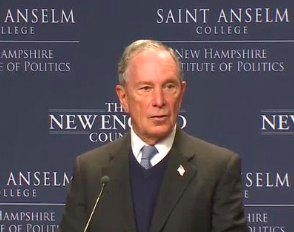Former New York City mayor and founder of Bloomberg News, Mike Bloomberg, announced his candidacy for president last week, pitching himself as a moderate alternative to Warren and Sanders and a more polished alternative to Joe Biden.
But will blitzing voters with $31 million worth of TV ads and appealing to moderates dissatisfied with Biden be enough for Bloomberg to win the Democratic nomination and take on Trump?
Probably not.
A Morning Consult poll after Bloomberg’s announcement and found that only 4 percent of Democratic primary voters plan to vote for Bloomberg, and 25 percent disapprove of him — higher than any other Democratic candidate.
Sen. Bernie Sanders (I-Vt.) lambasted Bloomberg’s ad blitz at a town hall in New Hampshire after Bloomberg’s announcement, accusing him of trying to buy the election.
“We do not believe that billionaires have the right to buy elections, and that is why we are going to overturn Citizens United, that is why multi-billionaires like Mr. Bloomberg are not going to get very far in this election, that is why we are going to end voter suppression in America,” he said.
Bloomberg’s spending is impressive — more than all of his rivals save fellow billionaire Tom Steyer have spent on television ads this year. However, the question remains: Will moderate Democrats decide this election?
In 2016, Obama-Trump voters — those who supported former President Barack Obama then backed Donald Trump — helped defeat Hillary Clinton. Trump won in 206 counties that voted for Obama in 2008 and 2012, according to elections data from Governing Magazine. Blue-collar voters who had voted for Democrats their entire lives voted for Trump in 2016.
Clinton is a moderate in the modern Democratic Party — she recently got up on a stage with The New York Times to criticize the progressive policies of 2020 presidential hopefuls Sanders and Sen. Elizabeth Warren (D-Mass.). She won 52 percent of the moderate vote in 2016 but lost the election.
Winning the moderate vote isn’t enough.
More importantly, those who identify as “moderates” within the Democratic Party are a rapidly shrinking minority, as evidenced by the overwhelming surge of progressive Democrats who beat moderate, incumbent Democrats for House seats in the 2018 midterms.
Almost half of Democratic millennials identify as “socialist” or “democratic socialist,” which aligns them with more progressive Democrats like Sanders, 2020 presidential candidate Rep. Tulsi Gabbard (D-Hawaii) and House members like Rep. Alexandria Ocasio-Cortez (D-N.Y.). Gabbard, Sanders and Ocasio-Cortez — among other progressives — routinely criticize establishment Democrats and moderates who they say do not truly serve the American people’s interests.
Baby boomers are more likely to identify as and vote for “moderate” Democrats, but their generation loses influence as time passes and younger Americans with more radical views make up the electorate.
Furthermore, since the 2016 election, Democrats as a whole have moved further to the left — even boomers — according to the Pew Research Center.
“Through the first half of 2017, more Democratic voters identify as liberal (48 percent) than as moderate (36 percent) or conservative (15 percent),” Pew Research says. “In 2008, 41 percent of Democratic voters called themselves moderate, while 33% said they were liberal and 23 percent said they were conservative. And in 2000, Democratic voters who called their views moderate outnumbered liberals by 44 percent to 28 percent, while 23 percent said they were conservative.”
According to Gallup polling, Democrats have moved further left in their politics over the last 20 years and are more likely to identify as “liberal” rather than “moderate” in 2019.
Perhaps that explains why Sanders is tied with Biden for the lead in the national polls, each claiming 27 percent of the Democratic vote.
According to the latest poll from Emerson, Sanders is still the only Democratic nominee who has the polling numbers to beat Trump, suggesting Democratic voters are a lot more radical than establishment Democrats think they are.
Could it be that Democrats need a “radical” to defeat a “radical” incumbent like President Trump?

